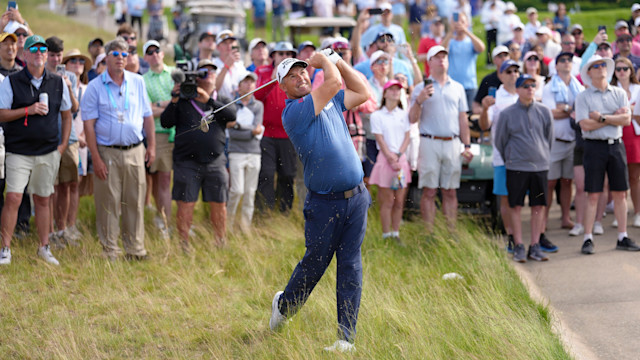quick coaching
What Cameron Young's First Tour Win Teaches Us About Golf's Mental Game
By Brendon Elliott, PGA
Published on

I watched Cameron Young drain that final putt at Sedgefield Country Club on Sunday, and honestly? The guy looked almost confused. "Where do I go?" he said after tapping in for par. "I've never done this before."
After seven runner-up finishes and what seemed like endless heartbreak, Young finally broke through with a dominant six-stroke victory at the Wyndham Championship. But here's what struck me most: this wasn't just about talent finally paying off. It was a masterclass in how the right mental approach can unlock years of potential.
Stop Needing It So Badly
Young's most significant shift? He stopped treating victory like a life-or-death situation. There was a time when those runner-up finishes "wore on Young," especially the five he posted during his 2022 Rookie of the Year campaign.
But something changed this year. Instead of carrying the weight of expectation, Young reframed winning as simply "something that I hadn't done, and I'd like to." That's not just semantic — it's psychological gold.
I wish more of my junior players would figure this out sooner in their development.
Think about your own golf breakthrough moments:
- That first time breaking 90, 80, or 70
- Winning your club championship
- Making your first eagle
The golfers who achieve these milestones consistently share one trait: they want success without needing it. The moment you attach your self-worth to a scorecard, you're playing scared.
When Struggle Breeds Gratitude
Here's something counterintuitive Young discovered: he actually became more grateful for good opportunities after struggling early in the season. When good rounds became scarce, he appreciated them more deeply.
Most golfers do the opposite. We get frustrated when we're not playing our best, focusing on what's going wrong instead of what's going right. Young flipped this script entirely.
Try this after your next round:
- Name three specific shots you're proud of from that day
- Identify one moment where you made a smart decision under pressure
- Acknowledge the opportunity itself — how many people get to play golf regularly?
This isn't feel-good nonsense. Gratitude literally rewires your brain to notice positive patterns instead of dwelling on mistakes.
The Art of Strategic Patience
Cameron Young came out Sunday with a plan to "see how many I could win by," but halfway through the round, his brain said, "Let's make some pars." That mental shift — from aggressive to conservative based on situation rather than emotion — separates weekend warriors from champions.
Most recreational golfers do the exact opposite. They start conservatively, then press when they smell a good score. Young had the discipline to shift gears when ahead.
The next time you're having a career round:
- Recognize the moment when pressing could cost you
- Commit to solid contact over perfect shots
- Trust your routine instead of changing what's working
- Play for the middle of greens rather than hunting pins
Building Breakthrough Momentum
Young's final-round scoring average in those seven runner-up finishes was 66.7 — he wasn't choking under pressure. He was simply waiting for everything to align. This victory came after "watching nearly a dozen others hoist hardware following their breakthrough victories" this season, and he "ran away with the title" leaving "virtually no doubt".
The compound effect of consistent preparation isn't linear. You might struggle for months, then suddenly everything clicks. Young's recent form — including this win — proves that breakthrough moments often emerge from patient, persistent work.
A Drill That Builds Mental Toughness
Want to develop Young's kind of mental resilience? Try this progressive confidence drill that mirrors his patient approach:
The Three-Target Challenge
Setup: Pick your most reliable club (usually 7 or 8-iron) and three targets:
- Close target: 75% of normal distance
- Standard target: Your typical distance
- Stretch target: 110% of normal distance
The Process:
Step 1 - Foundation Building
Hit 5 shots to the closest target focusing purely on solid contact. Success = 4 clean strikes. Don't advance until you succeed.
Step 2 - Normal Challenge
Move to the standard distance only after step 1 success. Same tempo, same focus. The key: resist the urge to swing harder.
Step 3 - Maximum Test
Attempt the longest target only after conquering the previous two. Maintain your rhythm while making a full, committed swing.
Why it works: You're building confidence systematically, just like Young built his game over four seasons. Each success creates momentum for the next challenge.
The Breakthrough Mindset
Young's Wake Forest teammate Will Zalatoris called this victory "a statement to his mental toughness" — and he's right. But that toughness wasn't born from forcing things. It came from patience, perspective, and trusting the process even when results didn't immediately follow.
Young's journey from talented runner-up to champion offers a roadmap: want it, don't need it. Appreciate what you have. Stay patient under pressure. Trust that consistent work eventually pays off.
The next time you're grinding through your own golf struggles, remember that confused look on Young's face after his first win. Sometimes the biggest breakthroughs come not from trying harder, but from finally getting out of your own way.
PGA of America Golf Professional Brendon Elliott is an award-winning coach and golf writer. Read his recent Monday Recap on RG.org and his stories on Athlon Sports. To stay updated on his latest work, sign up for his newsletter and visit OneMoreRollGolf.com.


